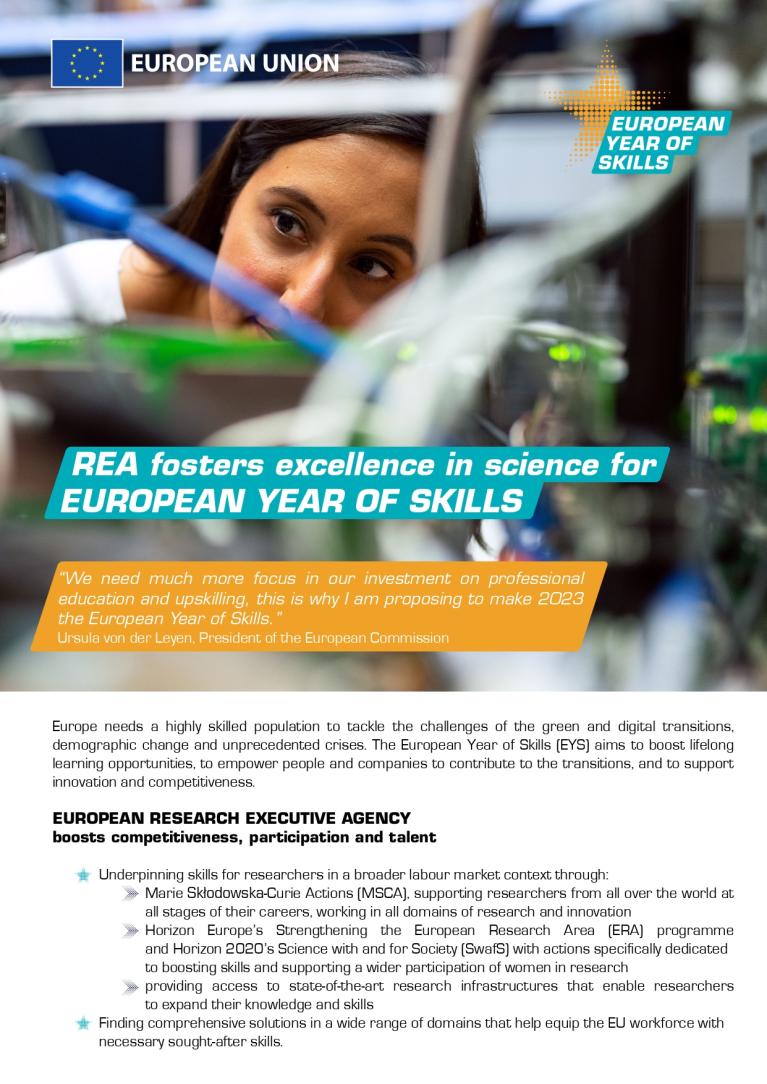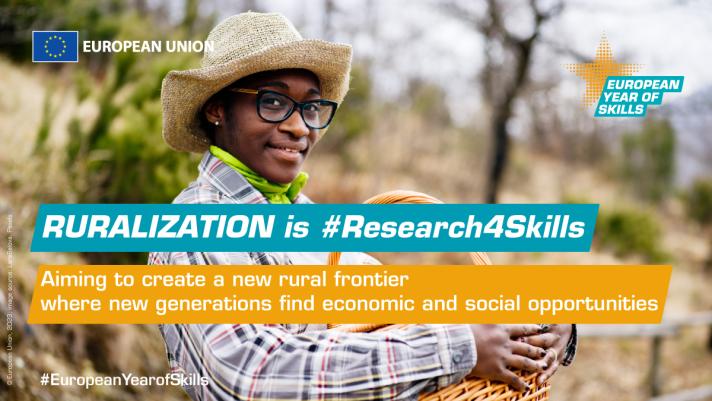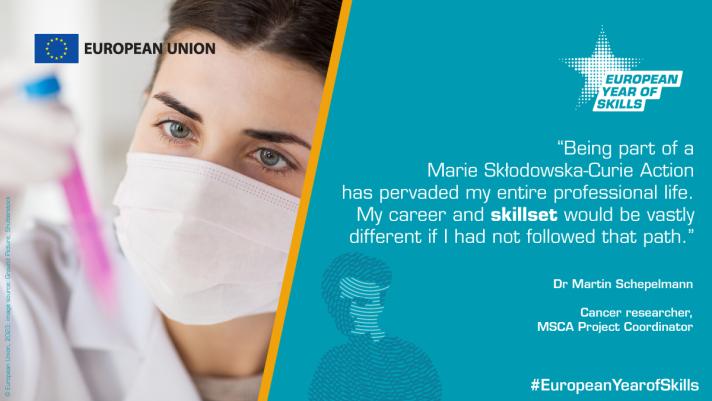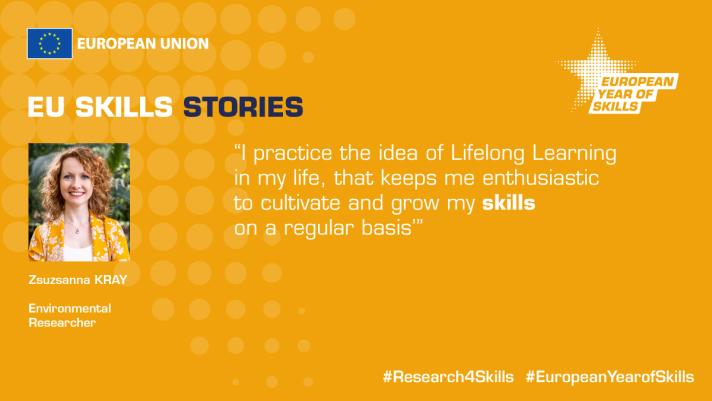European Year of Skills
The European Research Executive Agency (REA) is working to help deliver the European Year of Skills 2023 in two important ways.
First, the Agency manages several parts of EU research and innovation programmes that underpin skills for researchers in a broader labour market context:
- The Marie Skłodowska-Curie Actions (MSCA) supports researchers at all stages of their careers in all domains of research
- Horizon Europe Strengthening the European Research Area (ERA) programme and Horizon 2020 Science with and for Society (SwafS), with actions specifically dedicated to boosting skills and supporting a wider participation of women in research.
- Research Infrastructures enables researchers to expand their knowledge and skills.
Second, research performed by projects managed in REA feeds into the main objectives of the Year of Skills:
- Promoting skills for STEM (Science, Technology, Engineering and Mathematics), the Green Deal and the digital transition
- Focusing on the developments in the labour market and the economy
- “Skills for Life” – contributing to the concept of life-long learning
- Providing insights into expanded social inclusion and the labour market
- Improving women participation in IT and STEM fields
- Removing the barriers and expanding opportunities for workers from outside the EU
Factsheet
REA manages 446 projects working with more than €1.1 billion in EU contribution that support skills development. Find out more in our factsheet:

- General publications
- 4 May 2023
Plenty of projects are managed by REA in skills. They include the GreenSCENT and ECF4CLIM projects that aim to develop curricula and certification programmes which embrace Green Deal goals. Another project, WIRED, investigates the underlying reasons for lower participation of women in STEM fields while MIRnet aims to tackle the increasing importance of migration-themed research.
The POTENTIALS project explores new ways to foster job-creation and economic activities for the so-called ‘Coal Regions in Transition’. Continuing with the underlying theme of job creation, the PILLARS project plans to provide policymakers with the knowledge of which future in-demand professions and skills. MIDIC analyses the importance of intercultural competences of migrant descendants and how it benefits the job market.
REA-managed projects contributing to skills development
Skills for STEM, Green Deal and Digital Transition
HEREWEAR: Bio-based materials for locally manufactured, sustainable and circular clothing
The EU-funded HEREWEAR project seeks to upskill textile jobs by using locally manufactured, emerging sustainable technologies and bio-based resources. By connecting regional micro factories via networks, HEREWEAR aims to establish a bio-based circular textile clothing market segment of EUR 300 million, securing and improving 1200 textile manufacturing jobs in the EU supporting the Green Deal objectives.

CENTRINNO: Solutions for the regeneration of industrial historic sites
The EU-funded CENTRINNO project develops solutions for the regeneration of industrial historic sites as new creative manufacturing hubs that are ecological and socially inclusive. CENTRINNO gives centre stage to skilled craftsmen, vocationally trained professionals, entrepreneurs, makers, and SMEs to become key players in the future of cities.
Skills for labour market, economy, upskilling and reskilling and social inclusion
ENABLECARES: Priming talent for success in Biomedicine
The EU-funded ENABLECARES consortium provides high-level training on Open Science, entrepreneurship and other related transferable skills to talented young scientists in Europe. ENABLECARES will track the career paths that young researchers follow completing their courses. This information sets the basis for further actions to modernise PhD programmes, causing greater employment opportunities in the long term.
RURALIZATION: Rejuvenating rural life and the economy
European economic, social and territorial cohesion is threatened by the unequal development of growing urban and declining rural areas. RURALIZATION offers new generations stimulating opportunities for economic and social sustainability within a rural context. These opportunities will serve both existing inhabitants of rural areas and newcomers to overcome the lack of economic opportunities in the countryside.

DocTalent4EU: Enhancing employability of doctoral graduates
To increase the prospects for the employment of doctoral graduates, the DocTalent4EU project draws on the European Skills, Competences, and Occupations (ESCO) framework to develop a strong, visible and innovative recognition system of the most in-demand transferable skills. The project works with public authorities, industries and business to improve transferable skills training and to develop local talent management centres. In the long term, it will predict the most in-demand skills.
The Martí Franquès Programme (MFP): Doctoral fellowships for key skills
Skills mismatches in the private sector can be problematic as companies seek specific skills or work experience to perform niche jobs that doctoral fellows may not have. To tackle this, the Martí Franquès Programme (MFP) attracts talented doctoral candidates to work on ground-breaking research projects to better train for key skills needed in the private sector. It provides improved employment and working conditions by connecting fellows with industrial partners in short stay work experiences.
Improving women participation in IT and STEM
DESIRA: Digitisation - Economic and Social Impacts in Rural Areas
Digitalisation brings opportunities as well as challenges. The DESIRA project aims to improve how society tackles them in rural areas with a focus on agriculture and forestry. It seeks to provide tools and mechanisms that will support decision making related to digitisation. It will enhance lifelong digital skills and social inclusion and promote digital innovations.

Skills for Employees from Third Countries
MICADO: Solutions for migrant integration
The rise of migrant flows in Europe from outside the EU has increased the need for information for public administrations and society. The MICADO project has created a solution to support migrant integration, exploiting existing and new data to design digital services. Pilots in Antwerp (Belgium), Bologna (Italy), Hamburg (Germany) and Madrid (Spain) engaged civic society, migrants and refugees and provided a model for a better social inclusion in Europe.
Testimonials
The European Year of Skills is about training individuals to upskill and reskill to help them find jobs, boost their career and improve their lives.
In an exclusive interview, Dr. Martin Schepelmann – a former Marie Skłodowska-Curie Actions fellow and current project coordinator – talks about the impactful role the programme has played in his research career. The Austrian scientist also offers valuable advice to aspiring researchers wishing to develop a life-long skillset.

Additionally, we talked to four people involved – to varying degrees - in EU-funded research projects on skills development, how EU research benefitted them and how it can benefit others.
Star Ngei is a maker and activist from Kenya, currently living in Poland. They are involved with the Critical Making project, which is studying the global maker community to reveal its public benefit. The goal is to encourage open access and inclusiveness while fostering positive change skills.
Three of testimonials are from people involved in OTTER, which is addressing the waning interest in STEM amongst young people. It will enhance ‘education outside the classroom’ (EOC) methods to spur interest in these subjects. They are Johanna Järvinen-Taubert and Päivi Valtonen, who both work with Learning Scoop, and Zsuzsanna Kray, an environmental researcher.

Can you tell us a bit about yourself – your background and how you heard about or got involved in the project?
Star Ngei: I started out studying economics but ended up pivoting into hardware and electronics prototyping for special effects and other projects. I also run skill-sharing workshops with high schoolers. I heard about the Critical Making project through the Global Innovation Gathering, that is part of the project.
Johanna: I work as a pedagogical director of Learning Scoop, a Finnish co-operative in the field of teacher education. I have previously worked as a teacher, teacher trainer and university researcher. We got involved in the OTTER project through our European networks.
Päivi Valtonen: I am a co-founder of Learning Scoop and LessonApp, an application for teachers to design quality lessons. Learning Scoop is a partner in the OTTER project.
Zsuzsanna Kray: Sustainability and education have been my mission since I graduated as an environmental researcher. As for the OTTER project, I felt honoured to have been invited first as an Advisory Board member.
Based on your own experience, what advice would you have for people looking to learn new skills or make a change in their career? How do they think learning new skills can lead to a positive change in their career path and lead to new life experiences?
Star: Learning is a continuous process - we learn something new every day and have a bigger capacity to learn than we think. Having that approach and seeing things in that perspective makes learning a new skill a little less intimidating.
Johanna: Education could have a big role in developing transversal skills, but it requires opportunities to learn not just new knowledge but also new skills and competencies during studies. Furthermore, if we want to gain the skills needed in real life, we must practice them in actual situations.
Päivi: Develop a good understanding of your present expertise, while valuing expertise you have acquired through informal learning. Moreover, develop an understanding of your weaknesses so you know where to best focus your attention.
Zsuzsanna: Each year, I dedicate some time to learn new skills and let myself be led by my natural curiosity. To give an example, currently, I am in the supervision phase of a course at the Ecopsychology Institute to become Facilitator for Human-Nature (re)Connection and Guide for Participatory Nature Walks.

How did the research project directly impact and potentially benefit their professional lives?
Star: Making is a big part of my work and life. Workshops conducted by the Critical Making project that I have attended have been a valuable source of knowledge and ideas for my future projects.
Johanna: The OTTER project has taught me a lot about working in an international project. Learning more about different perspectives and approaches has been valuable, and now it is easier to understand what it takes to carry out an international project with multiple partners and countries.
Päivi: The OTTER project has offered many benefits and learning situations for our company Learning Scoop. We have gained a wonderful network of people from different fields and organisations in Europe. We truly believe in the power of cooperation, and this insight has strengthened in this project.
Zsuszanna: Being involved in a Horizon 2020 project is a great opportunity to be part of a team of excellent researchers and experts in their field, using cross-cutting solutions and being able to think outside the box (and the classroom!). It is always inspiring to see innovation coming to life step-by-step.

